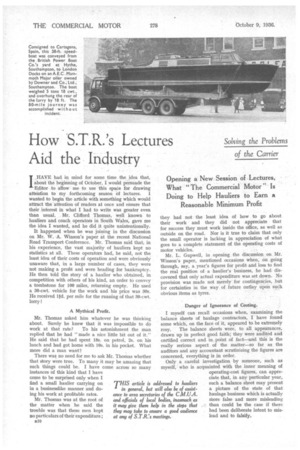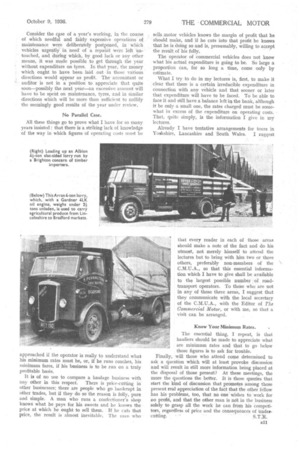How 'S.T.R.'s Lectures Solving the Problems Aid the Industry of
Page 44

Page 45

If you've noticed an error in this article please click here to report it so we can fix it.
the Carrier I_ HAVE had in mind for some time the .idea that, about the beginning of Oetober. I would persuade the • Editor Ito allow me to use this space for drawing attention to my forthcoming season of lectures. I wanted to begin the article with something which would attract the -attention of readers at once and ensure that their interest in what I had to write was greater even than usual. . Mr. Clifford. Thomas, well known to hauliers and coach operators in South Wales, gave me the idea I wanted, and he did it quite unintentionally.
It happened when he was joining in the discussion on Mr. W. A. Winson's paper at the recent National Road Transport Conference. Mr. Thomas said that, in. his experience, the vast majority of hauliers kept no statistics at all. These operators had, he said, not the least idea of their costs of operation and were obviously unaware that, in a large number of cases, they were not making a profit and were heading for bankruptcy. He then told the story of a haulier who obtained, in competition. with others of his kind, an order to convey a tombstone for 100 miles, returning empty. He used a 30-cwt. vehicle for the work and his price was 30s. He received led. per mile for the running of that 30-cwt. lorry !
A Mythical Profit.
Mr. Thomas asked him whatever he was thinking about. Surely he knew that it was impossible to del
work at that rate? To his astonishment the man replied that he had " made a nice little bit out of it." He said that he had spent 18s. on petrol, 2s, on his lunch and had got home with 10s. in his pocket. What more did a man want?
There was no need for me to ask Mr. Thomas whether that story were true. To many it may be amazing that
SO
such things could be. I have come across many instances of this kind that I have come to be surprised only when I find a small haulier carrying on in a businesslike manner and doing his work at profitable rates.
Mr. Thomas was at the root of the matter when he said the trouble was that these men kept no particulars of their expenditure ; BIO
they had not the least idea of how to go about their work and they did not appreciate that for success they must work inside the office, as well as outside on the road. Nor is it true to claim that only the small operator is lacking in appreciation of what goes to a complete statement of the operating costs of motor vehicles.
Mr. L. Gupwell, in opening the discussion Oil Mr. Winson's paper, mentioned occasions when, on. going through, say, a year's figures for profit and loss to find the real position of a haulier's business, he had discovered that only actual expenditure was set down. No provision was made not merely for contingencies, but for certainties in the way of future outlay upon such obvious items as tyres.
Danger of Ignorance of Costing.
I myself can recall occasions when, examining the balance sheets of haulage contractors, I have found some which, on the face of it, appeared to be extremely
rosy. The balance sheets were, to all appearances, drawn up in perfect good faith; they were audited and certified correct and in point of fact—and this is the really serious aspect of the matter—so far as the auditors and any accountant scrutinizing the figures are concerned, everything is in order.
Only myself, a careful investigation by someone, such as who is acquainted with the inner meaning of operating-cost figures, can appreciate that, in any particular year, such a balance sheet may present a picture of the state of that haulage business which is actually more false and more misleading than could be the case if there had been deliberate intent to mislead and to falsify.
Consider the 9se of a year's working, in the course Of which needful and fairly expensive operations of maintenance were deliberately postponed, in v.-hich vehicles urgently in needof a repaint were left untouched, and during which, by good luck or any other means, it was made possible to get through the year without expenditure on tyres. In that year, the money which ought to have been laid out in those various directions would appear as profit. The accountant or auditor is not in a position to appreciate that quite soon—possibly the next year—an excessive amount will have to be spent on maintenance, tyres, and in similar directions which will be more than sufficient to nullify the seemingly good results of the year under review,
No Parallel Case.
All these things go to prove what I have for so many years insisted : that there is a striking lack of knowledge of the way in which figures of operating costs must be
approached if the operator is really to understand what his minimum rates must be, or, if he runs coaches, his minimum fares, if his business is to be run on a truly profitable basis.
It is of no use to compare a haulage business with any other in this respect. There is price-cutting in other businesses; there are people who go bankrupt in other trades, but if they do so the reason is folly, pure and simple. A man who runs a confectioner's shop knows what he pays for his sweets and he knows the price at which he ought to sell them. If he cuts that price, the result is almost inevitable. The man who
sells motor vehicles knows the margin of profit that he should make, and if he cuts into that profit he knows that he is doing so and is, presumably, willing to accept the result of his folly.
The operator of commercial vehicles does not know what his actual expenditure is going to be. So large a proportion can, for so long a time, come only by estimate.
What I try to do in my lectures is, first, to make it clear that there is a certain irreducible expenditure in connection with any vehicle and that sooner or later that expenditure will have to be faced. To be able to face it and still have a balance left in the bank, although it be only a small one, the rates charged must be somewhat in excess of the expenditure on operating costs. That, quite simply, is the information I give in my lectures.
Already I have tentative arrangements for tours in Yoakshire, Lancashire and South Wales. I tuggest
that every reader in each of those areas should make a note of the fact and do his utmost, not merely himself to attend the lectures but to bring with him two or three others, preferably non-members of the C.M.U.A., so that this essential information which I have to give shall be available to the largest possible number , of roadtransport operators. To those who are not in any of those three areas, I suggest that they communicate with the local secretary of the C.M.U.A., with the Editor of The Commercial Motor, or with me, so that a visit can be arranged.
Know Your Minimum Rates.
The essential thing, I repeat, is that hauliers should be made to appreciate what are minimum rates and that to go below those figures is to ask for trouble.
Finally, will those who attend come determined to ask a question which will at least provoke discussion and will result in still more information being placed at the disposal of those present? At these meetings, the more the questions the better. It is these queries that start the kind of discussion that promotes among those present real appreciation of the fact that the other fellow has his problems, too, that no one wishes to work for no profit, and that the other man is ndt in the business solely to grasp all the work he can from his competitors, regardless of price and the consequences of Undercutting,




























































































